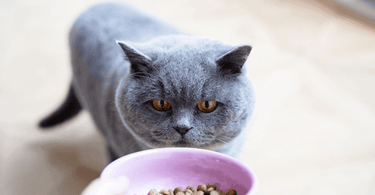Understanding the nutritional needs of British Shorthairs
British Shorthair cats have specific nutritional needs that differ from other breeds. Due to their stocky build, they tend to be prone to obesity, so it's important to provide them with a diet that supports a healthy weight. In addition, their dense coats require nutrients that promote skin and coat health. British Shorthairs also have a lower activity level compared to some other breeds, so their calorie intake should be moderated accordingly.
To meet these needs, cat food for British Shorthairs should be rich in high-quality protein sources, such as chicken or fish, to support muscle development and maintenance. It should also contain essential fatty acids like Omega-3 and Omega-6, which promote healthy skin and a shiny coat. British shorthairs will benefit from cat food formulated with controlled calorie levels to prevent excessive weight gain. Understanding these nutritional requirements will help you choose the best cat food for your British Shorthair.
Factors to consider when choosing cat food for British Shorthairs
When selecting cat food for your British Shorthair, it's important to consider several factors to ensure you are providing the best nutrition for your furry friend. First and foremost, check the ingredient list. Look for high-quality protein sources as the main ingredient, preferably named meats like chicken, turkey, or fish. Avoid cat foods that contain fillers like corn, wheat, or soy, as these have little nutritional value and can contribute to weight gain.
Another crucial factor to consider is the age of your British Shorthair. Kittens have different nutritional needs than adult cats, so it's important to choose a cat food that is specifically formulated for kittens.
Lastly, consider any specific dietary needs or sensitivities your British Shorthair may have. Some cats have allergies or sensitivities to certain ingredients, such as grains or dairy. If your cat has any known allergies or sensitivities, opt for cat food that is free from those ingredients.
Top ingredients to look for in cat food for British Shorthairs
When choosing the right cat food for a British Shorthair, it's important to look for specific ingredients that support their unique nutritional needs. High-quality protein sources should be the primary ingredient in the cat food, as this is essential for their muscle development and maintenance. Look for named meats like chicken, turkey, or fish as the first ingredient on the label. These protein sources provide the necessary amino acids that British Shorthairs need for optimal health.
In addition to protein, British Shorthairs require a balanced blend of essential fatty acids, such as Omega-3 and Omega-6, to maintain a healthy skin and coat. Look for cat food that includes ingredients like fish oil, as these are excellent sources of these essential fatty acids.
It's also important to ensure that the cat food contains essential vitamins and minerals, such as taurine, which is crucial for heart and eye health. Antioxidants like vitamin E help support the immune system and overall well-being. By choosing cat food with these essential nutrients, you can ensure that your British Shorthair is getting the best possible nutrition.
Should British Shorthair cats eat wet or dry cat food?
When it comes to choosing cat food for your British Shorthair, you have the option of wet or dry food. Both options have their advantages, and the decision ultimately comes down to your cat's preferences and specific needs. At Tippaws, we usually recommend a mixed wet and dry diet.
Wet cat food, also known as canned cat food, typically contains higher moisture content, which can be beneficial for cats who don't drink enough water. It is also often more palatable and can be easier to eat for cats with dental issues. Wet cat food can be a good option if your British Shorthair has a history of urinary tract issues, as it can help increase their water intake and promote urinary health. However, it's important to note that wet cat food can be more expensive and has a shorter shelf life once opened.
Dry cat food, on the other hand, provides a complete diet for your British Shorthair with all vitamins and minerals required for a healthy life. It is also convenient and often more cost-effective. Dry food is also extremely beneficial for promoting dental health, as the act of chewing dry kibble can help reduce plaque and tartar buildup. This is extremely important for British Shorthairs as they are particularly susceptible to dental disease.
Common dietary issues in British Shorthairs and how to address them
While British Shorthairs are generally a healthy breed, they can be prone to certain dietary issues. One common issue is urinary tract problems, such as bladder stones or urinary tract infections. These issues can be exacerbated by a diet that is low in moisture or lacks the appropriate balance of minerals. To prevent urinary tract problems, it's important to provide your British Shorthair with a diet that promotes urinary health. Choose a food that is formulated to maintain a healthy urinary pH.
Another common dietary issue in British Shorthairs is obesity. Due to their stocky build and lower activity levels, British Shorthairs are prone to weight gain. To prevent obesity, it's important to monitor their calorie intake and ensure that they are getting regular exercise. Feeding measured portion sizes and engaging your British Shorthair in play sessions or interactive toys can help keep them active and maintain a healthy weight.
If your British Shorthair has any specific dietary issues or health concerns, it's important to work closely with your vet to develop a diet plan that meets their individual needs. Regular vet check-ups and monitoring their weight and overall health are essential for maintaining their well-being.
Conclusion: what is the best food for British shorthairs?
In conclusion, providing the best nutrition for your British Shorthair cat is essential for their overall health and wellbeing. It’s important to prioritise high-quality protein sources, essential fatty acids, and the right balance of vitamins and minerals. Transitioning your British Shorthair to a new cat food should be done gradually, and any dietary issues or concerns should be addressed with the guidance of a vet. By taking these steps, you can provide your British Shorthair with the best nutrition possible.
Subscribe to our newsletter to get 10% off your first order.

